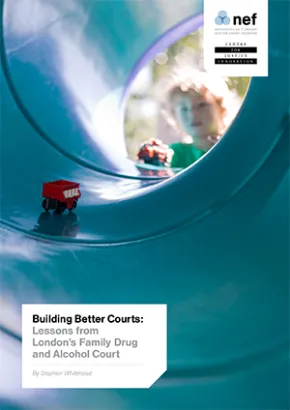The London Family Drug and Alcohol Court is one of the UK’s most established problem-solving courts. It works with families who are at risk of having children removed due to parental substance misuse, providing drug treatment and support to give parents the chance to change.
Since the London court opened in 2008, it has been the subject of two positive evaluations from Brunel University, and has been replicated at a further 8 sites in England. The team that established it has gone on to form the FDAC National Unit to support the rollout of further courts.
This report looks at the early history of FDAC and tries to unpick some of the reasons for its success. It looks at how the idea was born, how supporters lobbied for central government support, and how the pilot was funded and evaluated.
Strategies for successful innovation
Our research has identified a number of key strategies adopted during this period which contributed to success:
- Target a clearly defined and well-evidenced problem, relevant to policymakers and local commissioners.
- Draw on evidence about how other areas have successfully addressed that problem to identify promising ideas for your area.
- Don’t just replicate what’s worked elsewhere, however: tailor ideas to your local context.
- Bring together a coalition of supporters for your idea with a diverse range expertise and authority.
- Ensure that you build evaluation into the project from the start – have a clear idea of what success looks like, and what data you will need to capture to know whether that success has been achieved.
- When thinking about how to fund your project look for opportunities to make use of existing resources like staff time and facilities to reduce the overall budget.
- Identify where your project might save money in the short term for local agencies: this will be key to making a case for investment
